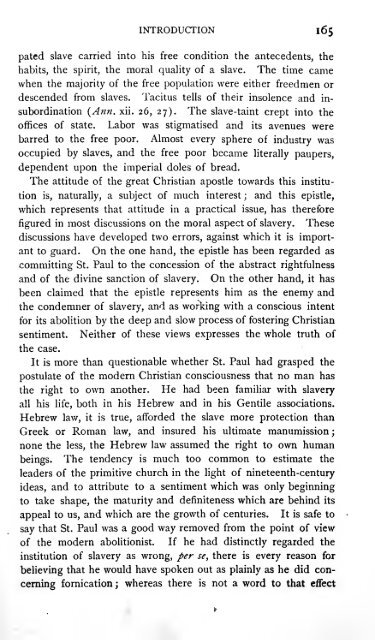Philippians and Philemon - MR Vincent - 1906.pdf
Philippians and Philemon - MR Vincent - 1906.pdf
Philippians and Philemon - MR Vincent - 1906.pdf
You also want an ePaper? Increase the reach of your titles
YUMPU automatically turns print PDFs into web optimized ePapers that Google loves.
INTRODUCTION l6$<br />
pated slave carried into his free condition the antecedents, the<br />
habits, the spirit, the moral quality of a slave. The time came<br />
when the majority of the free population were either freedmen or<br />
descended from slaves. Tacitus tells of their insolence <strong>and</strong> in-<br />
subordination {Ann. xii. 26, 27), The slave-taint crept into the<br />
offices of state. Labor was stigmatised <strong>and</strong> its avenues were<br />
barred to the free poor. Almost every sphere of industry was<br />
occupied by slaves, <strong>and</strong> the free poor became literally paupers,<br />
dependent upon the imperial doles of bread.<br />
The attitude of the great Christian apostle towards this institu-<br />
tion is, naturally, a subject of much interest ; <strong>and</strong> this epistle,<br />
which represents that attitude in a practical issue, has therefore<br />
figured in most discussions on the moral aspect of slavery. These<br />
discussions have developed two errors, against which it is import-<br />
ant to guard. On the one h<strong>and</strong>, the epistle has been regarded as<br />
committing St. Paul to the concession of the abstract rightfulness<br />
<strong>and</strong> of the divine sanction of slavery. On the other h<strong>and</strong>, it has<br />
been claimed that the epistle represents him as the enemy <strong>and</strong><br />
the condemner of slavery, <strong>and</strong> as working with a conscious intent<br />
for its abolition by the deep <strong>and</strong> slow process of fostering Christian<br />
sentiment. Neither of these views expresses the whole truth of<br />
the case.<br />
It is more than questionable whether St. Paul had grasped the<br />
postulate of the modern Christian consciousness that no man has<br />
the right to own another. He had been familiar with slavery<br />
all his life, both in his Hebrew <strong>and</strong> in his Gentile associations.<br />
Hebrew law, it is true, afforded the slave more protection than<br />
Greek or Roman law, <strong>and</strong> insured his ultimate manumission;<br />
none the less, the Hebrew law assumed the right to own human<br />
beings. The tendency is much too common to estimate the<br />
leaders of the primitive church in the light of nineteenth-century<br />
ideas, <strong>and</strong> to attribute to a sentiment which was only beginning<br />
to take shape, the maturity <strong>and</strong> definiteness which are behind its<br />
appeal to us, <strong>and</strong> which are the growth of centuries. It is safe to<br />
say that St. Paul was a good way removed from the point of view<br />
of the modern abolitionist. If he had distinctly regarded the<br />
institution of slavery as wrong, per se, there is every reason for<br />
believing that he would have spoken out as plainly as he did con-<br />
cerning fornication; whereas there is not a word to that effect





